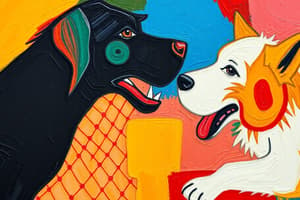Podcast
Questions and Answers
According to behaviorists, what is the true cause of behavior?
According to behaviorists, what is the true cause of behavior?
- Both thoughts and beliefs and external events
- Internal physiological processes
- Thoughts and beliefs
- External events in the environment (correct)
What is the relationship between a neutral stimulus and an unconditioned stimulus in classical conditioning?
What is the relationship between a neutral stimulus and an unconditioned stimulus in classical conditioning?
- The neutral stimulus causes the unconditioned response
- They are the same thing
- The neutral stimulus is paired with the unconditioned stimulus to elicit a conditioned response (correct)
- The unconditioned stimulus causes the neutral response
What did Pavlov call the reflex that caused a dog to secrete digestive juices upon seeing the lab worker who fed the dogs?
What did Pavlov call the reflex that caused a dog to secrete digestive juices upon seeing the lab worker who fed the dogs?
- Automatic reflex
- Conditioned reflex (correct)
- Unconditioned reflex
- Neutral reflex
Study Notes
Overview of Behaviorism and Pavlov's Observation
- Behaviorists focus on observable behavior rather than mental events.
- B.F. Skinner suggested that statements about mental experiences can be translated into descriptions of behavior.
- The behaviorist perspective aligns with legal systems that emphasize factual descriptions of witnessed events.
- Behaviorists reject the notion that thoughts and beliefs cause behavior and argue that external events in the environment are the true causes of behavior.
- Jacques Loeb applied behaviorism to animal behavior, suggesting that their movements are driven by external factors rather than will or purpose.
- Behaviorists aim to explain behavior, including learning, through stimulus-response associations.
- Pavlov observed that a dog would secrete digestive juices upon seeing the lab worker who fed the dogs, which he called a conditioned reflex.
- Pavlov's work on classical conditioning explored the relationship between stimuli and learned responses.
- Animals have automatic connections called unconditioned reflexes between a stimulus and a response.
- New reflexes can be acquired by transferring a response from one stimulus to another, such as salivating to a sound that predicts food.
- In classical conditioning, a neutral stimulus is paired with an unconditioned stimulus to elicit a conditioned response.
- The conditioned response can differ from the unconditioned response.
Studying That Suits You
Use AI to generate personalized quizzes and flashcards to suit your learning preferences.
Description
Test your knowledge of behaviorism and Pavlov's observation with this informative quiz. Explore the fundamental principles of behaviorism, including the rejection of mental events as causes of behavior and the focus on observable behavior. Learn about Jacques Loeb's application of behaviorism to animal behavior and the stimulus-response associations that behaviorists use to explain learning. Discover how Pavlov observed the relationship between stimuli and learned responses in his work on classical conditioning, including the acquisition of new reflexes and the difference between conditioned and un




